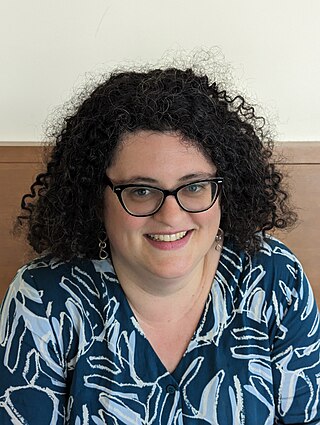
Language is a structured system of communication that consists of grammar and vocabulary. It is the primary means by which humans convey meaning, both in spoken and signed forms, and may also be conveyed through writing. Human language is characterized by its cultural and historical diversity, with significant variations observed between cultures and across time. Human languages possess the properties of productivity and displacement, which enable the creation of an infinite number of sentences, and the ability to refer to objects, events, and ideas that are not immediately present in the discourse. The use of human language relies on social convention and is acquired through learning.

Philosophical Investigations is a work by the philosopher Ludwig Wittgenstein, published posthumously in 1953.
English grammar is the set of structural rules of the English language. This includes the structure of words, phrases, clauses, sentences, and whole texts.

"Politics and the English Language" (1946) is an essay by George Orwell that criticised the "ugly and inaccurate" written English of his time and examined the connection between political orthodoxies and the debasement of language.
Fresh Air is an American radio talk show broadcast on National Public Radio stations across the United States since 1985. It is produced by WHYY-FM in Philadelphia, Pennsylvania. The show's hosts are Terry Gross and Tonya Mosley. As of 2017, the show was syndicated to 624 stations and claimed nearly 5 million listeners. The show is fed live weekdays at 12:00 noon ET. In addition, some stations carry Fresh Air Weekend, a re-programming of highlights of the week's interviews. In 2016, Fresh Air was the most-downloaded podcast on iTunes.
Phonaesthetics is the study of the beauty and pleasantness associated with the sounds of certain words or parts of words. The term was first used in this sense, perhaps by J. R. R. Tolkien, during the mid-20th century and derives from Ancient Greek φωνή (phōnḗ) 'voice, sound' and αἰσθητική (aisthētikḗ) 'aesthetics'. Speech sounds have many aesthetic qualities, some of which are subjectively regarded as euphonious (pleasing) or cacophonous (displeasing). Phonaesthetics remains a budding and often subjective field of study, with no scientifically or otherwise formally established definition; today, it mostly exists as a marginal branch of psychology, phonetics, or poetics.

Geoffrey Nunberg was an American lexical semantician and author. In 2001, he received the Linguistics, Language, and the Public Interest Award from the Linguistic Society of America for his contributions to National Public Radio's Fresh Air. Nunberg was the author of a number of popular books, among them Going Nucular: Language, Politics and Culture in Controversial Times (2004). He is primarily known for his broadcast work interpreting linguistic science for lay audiences, though his contributions to linguistic theory are also well regarded.
In linguistics, the term lexis designates the complete set of all possible words in a language, or a particular subset of words that are grouped by some specific linguistic criteria. For example, the general term English lexis refers to all words of the English language, while more specific term English religious lexis refers to a particular subset within English lexis, encompassing only words that are semantically related to the religious sphere of life.

Fuck is a 2005 American documentary film by director Steve Anderson about the word "fuck". The film argues that the word is an integral part of societal discussions about freedom of speech and censorship. It examines the term from perspectives which include art, linguistics, society and comedy, and begins with a segment from the 1965 propaganda film Perversion for Profit. Scholars and celebrities analyze perceptions of the word from differing perspectives. Journalist Sam Donaldson talks about the versatility of the word, and comedian Billy Connolly states it can be understood despite one's language or location. Musician Alanis Morissette comments that the word contains power because of its taboo nature. The film features the last recorded interview of author Hunter S. Thompson before his suicide. Scholars, including linguist Reinhold Aman, journalism analyst David Shaw and Oxford English Dictionary editor Jesse Sheidlower, explain the history and evolution of the word. Language professor Geoffrey Nunberg observes that the word's treatment by society reflects changes in our culture during the 20th century.

"On Translating Beowulf" is an essay by J. R. R. Tolkien which discusses the difficulties faced by anyone attempting to translate the Old English heroic-elegiac poem Beowulf into modern English. It was first published in 1940 as a preface contributed by Tolkien to a translation of Old English poetry; it was first published as an essay under its current name in the 1983 collection The Monsters and the Critics, and Other Essays.
Internet-related prefixes such as e-, i-, cyber-, info-, techno- and net- are added to a wide range of existing words to describe new, Internet- or computer-related flavors of existing concepts, often electronic products and services that already have a non-electronic counterpart. The adjective virtual is often used in a similar manner.

Talking Right, subtitled How Conservatives Turned Liberalism into a Tax-Raising, Latte-Drinking, Sushi-Eating, Volvo-Driving, New York Times-Reading, Body-Piercing, Hollywood-Loving, Left-Wing Freak Show, is a 2006 book by Geoffrey Nunberg, who applies his expertise as a linguist to the United States Democratic Party's failure to win elections.
Nucular is a common, proscribed pronunciation of the word "nuclear". It is a rough phonetic spelling of. The Oxford English Dictionary's entry dates the word's first published appearance to 1943.
Dennis Baron is a professor of English and linguistics at the University of Illinois at Urbana-Champaign. His research focuses on the technologies of communication; language legislation and linguistic rights; language reform; gender issues in language; language standards and minority languages and dialects; English usage; and the history and present state of the English language.
On Linguistic Aspects of Translation is an essay written by Russian-American linguist Roman Jakobson in 1959. It was published in On Translation, a compendium of seventeen papers edited by Reuben Arthur Brower. On Translation discusses various aspects of translation and was published in Cambridge, Massachusetts.
Language Log is a collaborative language blog maintained by Mark Liberman, a phonetician at the University of Pennsylvania.

Ascent of the A-Word: Assholism, the First Sixty Years is a 2012 book by the American linguist Geoffrey Nunberg which analyzes the history of the epithet "asshole".
Comprised of is an expression in English that means "composed of". This is thought by language purists to be improper because to "comprise" can already mean to "be composed of". By that definition, "comprised of" would be ungrammatical as it implies "composed of of". However, another widely accepted definition of to "comprise" is to "compose", hence the commonly accepted meaning of "comprised of" as "composed of".
Feminist language reform or feminist language planning refers to the effort, often of political and grassroots movements, to change how language is used to gender people, activities and ideas on an individual and societal level. This initiative has been adopted in countries such as Sweden, Switzerland and Australia.

Gretchen McCulloch is a Canadian linguist. On her blog, as well as her podcast Lingthusiasm she offers linguistic analysis of online communication such as internet memes, emoji and instant messaging. She writes regularly for Wired and previously did so for The Toast. In 2019, she published a book on internet linguistics, Because Internet: Understanding the New Rules of Language.









